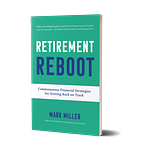This week, the newsletter features the last episode of the Retirement Rebootcast - the special podcast series on my new book - Retirement Reboot: Commonsense Financial Strategies for Getting Back on Track.
Retirement Reboot is chock full of practical strategies for your retirement plan. But in the last chapter of the book, I argue that we also must pay attention to public policy on our key social insurance programs. And, I lay out my vision for expanding Social Security and pushing back against the growing privatization of Medicare - something I regard as antithetical to the very concept of social insurance.
My guests for this episode are two top experts on Social Security and Medicare who have a terrific sense of the historical trajectory of both programs. Judith Stein is the executive director and founder of the Center for Medicare Advocacy, one of the nation’s most important consumer protection and policy organizations working on Medicare. Nancy Altman is president of Social Security Works, which advocates for protection and expansion of Social Security. Nancy is one of the most knowledgeable people in the United States on Social Security. She is the author of several authoritative books on Social Security, and she serves on the Social Security Advisory Board, a nonpartisan federal agency that advises the President, Congress, and the Commissioner of Social Security.
I invited Judy and Nancy to join me for a discussion of social insurance - past, present and future. Click the player icon at the top of the newsletter to listen to the episode. You also can find the RetirementRevised.com podcast on Apple Podcasts or Spotify.
The entire six-part podcast series is now online. I hope you’ve enjoyed all of these conversations with experts on key retirement topics, but in case you missed any of them, here are links to earlier episodes.
Introduction: An overview of the book featuring a conversation with Chris Farrell, senior economics contributor for Marketplace, the public radio program. Chris wrote the foreward to Retirement Reboot.
Let’s Make a Plan. Far too many people don’t take the time to make an actual financial plan for retirement – and that’s a real misstep.
Optimizing Social Security. For most of us, Social Security will be the most important retirement benefit – full stop. Decisions about when to claim can make a big difference in your lifetime income.
Navigating Medicare. Along with Social Security, there’s nothing that will have a more important impact on your retirement security than making smart choices about navigating Medicare. The centrist thinking on social insurance reform that really isn’t
Building Savings. Starting as early as possible is the name of the game when it comes to saving for retirement. But if you’re getting close to retirement and haven’t been able to save much, don’t despair: it is still possible to build significant savings late in the game.
Toward a New Social Insurance Era. The argument for expanding Social Security, and for pushing back against the growing privatization of Medicare (today’s episode).
Beware the centrist arguments on Social Security reform
The Washington Post published an editorial this week laying out an approach to reforming Social Security and Medicare that typifies what passes for “centrist” thinking about these programs in Washington these days. It’s wrong in so many ways, but here are the most egregious elements that caught my eye:
The Post seems to favor a behind-closed-doors "super-committee" tasked with proposing solutions for up or down vote. That’s just a way for lawmakers to avoid accountability - we need transparent, open debate on these issues so we know where each and every politician stands. The "super-committee" idea allows lawmakers to "hold hands and jump off the cliff together," as they like to say, making unpopular and unwarranted cuts to social insurance programs. Let's debate the issues in the open and see who wants to cut benefits, and who does not.
The editorial conflates the financial issues facing these two programs - but they are very different. Social Security is funded mostly from payroll tax contributions, while Medicare funding is a hybrid of payroll taxes (Part A), and general revenue and premiums (Part B and Part D). The financial pressures affecting these two programs differ, and need to be thought about and addressed separately.
The Post seems to think that raising the Medicare age is a reasonable idea, suggesting that this would simply mirror the Social Security full retirement age (67 for those born after 1960.). But unifying the retirement ages for the two programs really makes no sense. Workers could still file for Social Security anytime from 62 to 70, and that wouldn't change.
There will be a push at some point to increase the Social Security full retirement age further, to age 70. Any change of that type most likely will affect younger workers, not people nearing retirement or already retired. And younger workers really need to pay attention this. The 1983 reforms that boosted the Social Security retirement age to 67 from 65 already has cut benefits by 13% for everyone born 1960 or later. GenX, Millenial and younger generations should realize they're already on track to get less out of the program than previous generations did. And younger workers certainly should oppose a higher Medicare age, which would push millions into higher-cost and less robust ACA policies after they retire while waiting for Medicare at 67.
The underlying idea that "everyone is living longer" and therefore "we all will be working longer" is false. Yes, higher-educated, more affluent people are living and working longer. But that's not true across the board. Vast majority of workers have filed for Social Security by their full retirement age.
Retirement Reboot in the news
There are no miracles, quick fixes for retirement saving. Chris Farrell reviews Retirement Reboot in his Minneapolis Star-Tribune column.
What I’m reading
The next retirement communities won’t just be for seniors . . . Target date funds had a rocky 2022 . . . Fed's interest-rate hikes make T-bills an attractive, safer investment . . . GoodRx leaked health data to Facebook and Google . . . Why states need master plans for aging . . . Government lets health plans that ripped off Medicare keep the money . . . Short on cash, more Americans tap 401(k) savings for emergencies . . . The market tanked, but Americans kept piling money into their 401(k)s . . . Mark Cuban and Amazon are shaking up generic drugs . . . Green funds cost three times more than you think . . . SEC puts dual-registered advisors on notice in risk alert . . . Retirees lost millions to romance scams during the pandemic . . . Navigating the first year of retirement, a couple hops on a tandem bike . . . The medicine is a miracle, but only if you can afford it.











